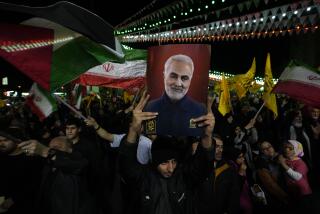GULF WATCH: Day 23 : A daily briefing paper on developments in the crisis
- Share via
Diplomatic Front:
Iraqi troops surrounded the American Embassy in Kuwait after the United States defied President Saddam Hussein’s orders to vacate the building. The Iraqis prevented Americans from entering or leaving the facility, but electricity and water were not cut off.
In Baghdad, authorities detained about 100 embassy staffers, dependents and Marine guards who left the embassy in Kuwait with the understanding they would be allowed safe passage to Turkey. The Iraqis said the group would be held as long as the embassy remained open.
In a move that increased fears that international unity could begin to erode, the Soviet Union complied with the Iraqi order to evacuate its embassy in Kuwait. Soviet President Mikhail S. Gorbachev, however, warned Iraq that the situation is “extremely dangerous.”
Jordan reversed an earlier decision to seal off its borders to a flood of international refugees from Kuwait, and Washington said it is providing $1 million and 500 tents to help Jordan cope with the refugee surge. Military Front:
Military reservists and National Guardsmen began packing their bags and reporting for duty as the first call-up in two decades began in earnest. Six Air National Guard and Air Force Reserve cargo-hauling units were among the first units to be mobilized.
United States officials charged that Iraq was receiving air shipments of chemical weapons and other war materiel in violation of the U.N. sanctions against Baghdad. The White House said it knew where the shipments originated, but it would not say publicly.
U.S. Army officials said Apache helicopters especially equipped to knock out enemy tanks were flying missions near the border between Saudi Arabia and Kuwait. Meanwhile, the battleship Wisconsin joined other U.S. warships in the Persian Gulf.
Military sources said the U.S. Central Command was preparing to move its headquarters from MacDill Air Force Base in Tampa, Fla., to Saudi Arabia over the weekend. The command is coordinating the military buildup in the Middle East. Trade Front:
Officials said the embargo on shipments of goods to and from Iraq is likely to emerge as the next key staging ground in the confrontation with Iraq. U.S. naval vessels are expected to begin using force this weekend to stop apparent embargo busters.
Oil prices declined somewhat and stock prices firmed as world financial markets took a breather from the panicky trading of previous days.
Concerns mounted about the willingness of key oil exporters to increase production to offset lost supplies from Iraq and Kuwait. Only about half of OPEC’s 13 members indicated they are willing to meet over the weekend to talk about possible production hikes. Crisis Indicators:
Iraqi troops in Kuwait: 160,000
Iraqi tanks in Kuwait: 1,000
U.S. troops on the ground: 40,000
U.S. troops en route: 60,000
U.S. sailors aboard ship in region: 35,000
U.S. ships in the region or en route: 70
U.S. reservists to be mobilized: up to 49,703
U.S. aircraft in region: 500
Americans in Iraqi custody: 56
U.S. diplomats in Kuwait: 10 to 20
Total Americans in Iraq and Kuwait: 3,000
Total Westerners in Iraq and Kuwait: 12,000
Crude oil (spot price per barrel): $31.10, down $.0465
Retail gasoline (U.S. average per gallon): $1.235, up $.009
Wholesale gasoline (spot price per gallon): $1.0565, up $.0465
Dow Jones industrial average: 2,532.92, up 49.50
More to Read
Sign up for Essential California
The most important California stories and recommendations in your inbox every morning.
You may occasionally receive promotional content from the Los Angeles Times.










